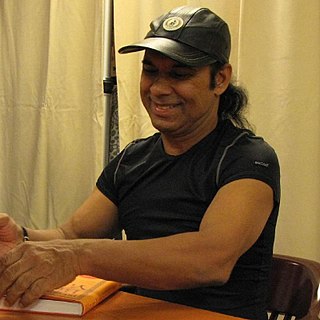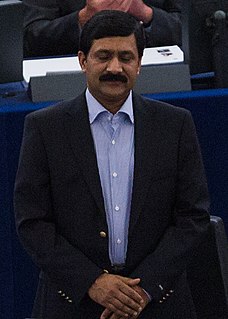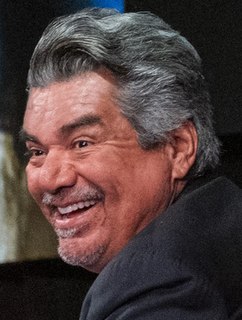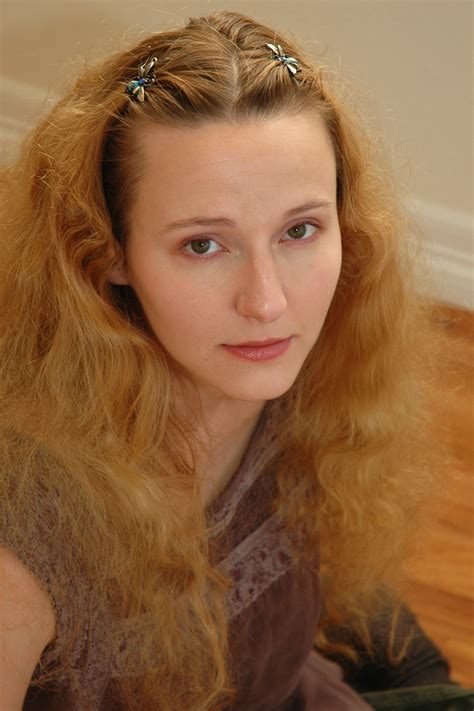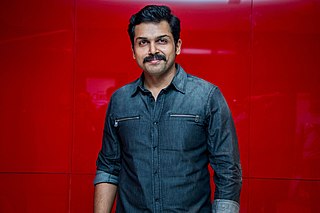A Quote by Carrie Vaughn
One inch at a time, that was how her father had taught her. You can't do anything but worry about the few inches right in front of you.
Related Quotes
I was raised by my grandmother. She had a very difficult time, raised all her kids, my father and everybody. Listening to those stories and finding her so strong, poised. Anybody who came close to her was made to feel blessed. And at the same time, it didn't matter how strong a person was, in front of her, their head would go down. She carried through her life raising everybody. That is my model.
The world taught women nothing skillful and then said her work was valueless. It permitted her no opinions and said she did not know how to think. It forbade her to speak in public and said the sex had no orators. It denied her the schools, and said the sex had no genius. It robbed her of every vestige of responsibility, and then called her weak. It taught her that every pleasure must come as a favor from men and when, to gain it, she decked herself in paint and fine feathers, as she had been taught to do, it called her vain.
Her father had taught her about hands. About a dog's paws. Whenever her father was alone with a dog in a house he would lean over and smell the skin at the base of its paw. This, he would say, as if coming away from a brandy snifter, is the greatest smell in the world! A bouquet! Great rumours of travel! She would pretend disgust, but the dog's paw was a wonder: the smell of it never suggested dirt. It's a cathedral! her father had said, so-and-so's garden, that field of grasses, a walk through cyclamen--a concentration of hints of all the paths the animal had taken during the day.
Her [Eleanor Roosevelt] father was the love of her life. Her father always made her feel wanted, made her feel loved, where her mother made her feel, you know, unloved, judged harshly, never up to par. And she was her father's favorite, and her mother's unfavorite. So her father was the man that she went to for comfort in her imaginings.
She should want to see me. If I had said how I feel about her, she would miss me even more. All this time, I've been breaking her heart by keeping her wait, yet I can't still appear before her eyes. I never want to see her cry anymore. Even if it means I no longer exist in her heart. How immature of me, right? -Kudou Shinichi
From the first time he'd met her, he'd sensed an air of contradiction about her. She was very much a woman, but still retained a waiflike quality. She could be brash, and at times deliberately suggestive, yet she was painfully shy. She was incredibly easy to get along with, yet she had few friends. She was a talented artist in her own right, but so self-conscious about her work that she rarely completed a piece and preferred to work with other people's art and ideas.
My grandmother instilled in me a toughness that comes with survival. She was a tough lady and never truly enjoyed her life. She would always worry about things and I would tell her that it wasn't going to get her anywhere and it didn't. I wasn't even that smart back then, but I knew that worrying about everyone else wasn't good for her health. As Latinos, we stress and worry so much about the future when the future is today. As long as we protect what's good in our lives, we will be all right.
Recollect that to a woman who gets her living by her pen, 'time is money,' as it is to an artist. Therefore, encroaching on her time is lessening her income. And yet how often is this done (either heedlessly or selfishly) by persons professing to be her friends, and who are habitually in the practice of interrupting her in her writing hours.
Hats change everything. September knew this with all her being, deep in the place where she knew her own name, and that her mother would still love her even though she hadn’t waved goodbye. For one day her father had put on a hat with golden things on it and suddenly he hadn’t been her father anymore, he had been a soldier, and he had left. Hats have power. Hats can change you into someone else.

